Factors That Accelerate Tooth Decay in People Over 60
After the age of 60, people experience a second wave of cavities due to tooth decay. The severity and frequency of this issue will increase with age. It becomes difficult to manage the decay due to various factors. Some factors are uncontrollable and require specialist consultations for professional dental attention. That’s why 65 Broadway Dental offers treatments suitable for seniors.
Gum disease is a common occurrence in the elderly, with the CDC (Centers for Disease Control and Prevention) stating that 20% OF elderly people suffer from untreated tooth decay. With the right care and identification of signs and symptoms, preventing decay in seniors is possible.
This blog shows why people over 60 are at greater risk of decay. It will also show you what the symptoms and signs of decay look like. Together, they will help you improve your or a loved one’s oral health.
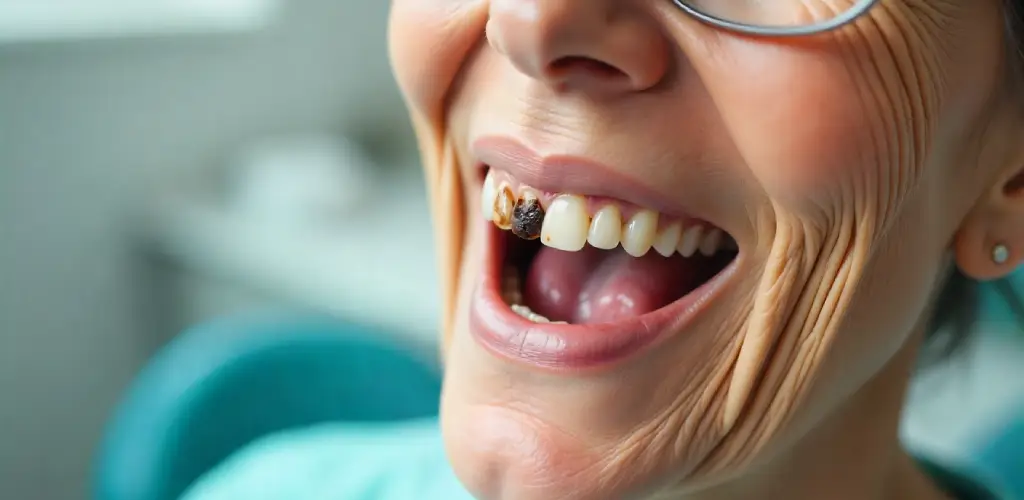
Why are People 60+ More Prone to Tooth Decay?
There are multiple reasons why people over 60 years old are increasingly at risk of cavities. When these factors combine, it makes sense why they can’t prevent tooth decay.
1. Weakened Immunity
Naturally, the immune system becomes weaker as we age. By age 60, the body can’t fight off bad oral bacteria as it previously could. That’s largely due to the reduced development of lymphocytes and production of antibodies.
If oral health is compromised, the rest of the body could also be compromised. Because dental health affects overall health, the elderly with decay and gum issues struggle to manage other conditions.
2. Dry Mouth
Another cause of increased cavities in the elderly is dry mouth. Without enough saliva, food particles remain in the mouth longer than they should. Saliva doesn’t just wash them away; it helps break particles down faster and facilitates swallowing.
Lower saliva production is not natural and is a side effect of over 500 medications. The medications that cause this are used to treat conditions like:
- Allergies
- High blood pressure
- Diabetes
- Depression or anxiety
- Parkinson’s disease
- Alzheimer’s disease
These aren’t the only culprits, as coffee and alcohol also lower saliva production.
3. Diet Adjustments
It’s no secret that diet changes in over-60-year-olds are common. Based on pre-existing health conditions, seniors need adjustments to their eating habits. They may need to reduce consumption of some items. They may choose to replace them with healthier alternatives.
Diabetics will reduce their sugar intake, while patients with hypertension will lower their salt intake. Changes to the diet can lead to an increase in potentially harmful foods. It can compromise the enamel layer of teeth.
“Maintaining a tooth-friendly diet that’s got Calcium, Magnesium, and Vitamin D is the first step to preventing tooth decay in seniors. It provides the nutrients necessary to support bone health and boost defense efforts.”
— Dr. Alexander Heifitz, founder of 65 Broadway Dental NYC
4. Gum Disease
Gum disease in its severe form is known as Periodontitis. Although it goes unnoticed, bleeding and receding gums are the warning signs of gum disease.
Gum disease occurs when bacterial infections affect the gums. They cause issues in the gums and affect the teeth. For instance, receding gums create empty pockets that can fill up with food particles or bacteria.
Once this happens, they start decaying your teeth, and at a faster rate if it isn’t treated.
5. Mobility Issues
Some seniors may find it troubling to maintain their dental care. Stiffness or shaking hands can slow down and hinder brushing motions. Therefore, making regular oral care activities more difficult to perform.
Plaque, tartar, and tooth decay are all signs of poor oral hygiene. The norm is that prevention is better than cure, and that’s true in the case of dental care.
Some people may be looking after an elderly family member and encountering this issue. They can consult their local dentist on how to better care for their dental health.
6. Enamel Erosion
Enamel is the outer surface of teeth and is responsible for protecting the inner layers. When damaged, teeth have little to no resistance to acids and bacteria.
Enamel can naturally wear away with time. The inner layers become weaker to rotting and infection. Erosion of enamel can be addressed through cosmetic dentistry and its procedures.
Repairing damaged enamel is critical to stop any further tooth damage. Without this hard outer layer, decay can easily affect the teeth. If left without treatment, these teeth could be lost.
7. Low Fluoride Levels
The mineral fluoride helps teeth develop and stay strong throughout life. It’s found in specific toothpastes and in water, but sometimes supplements are necessary. Unfortunately, fluoride intake or exposure decreases as we age.
Low levels of fluoride intake can increase the risk of cavities due to rotting. The presence of fluoride would make the teeth more resistant to bacteria and plaque. Fluoride allows for the remineralization of fading enamel on teeth.
Fluoride treatments, mouthwashes, and toothpastes are advisable for the elderly who lack fluoride. These help to maintain fluoride intake and ensure older adults aren’t at risk of tooth decay.
Learn more practical ways to stop oral issues before they start in our comprehensive guide on preventing dental problems.
What are the Stages of Tooth Decay in People Over 60?
The cavity-prone stage after 60 isn’t anything like the one that happens in children. It is slow initially and harder to spot. However, it can pick up pace once the decay reaches the inner layers.
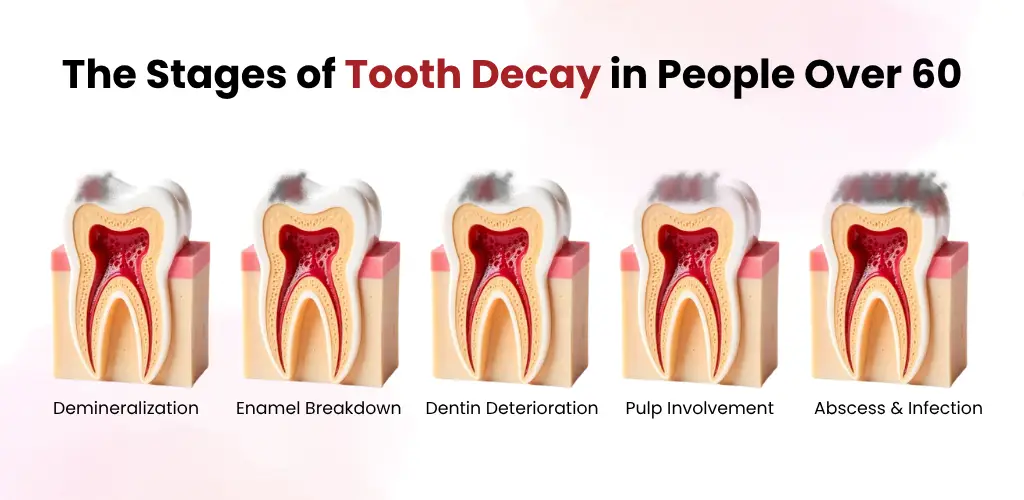
Stage 1: Demineralization
Bacteria start to attack teeth, using acid to deteriorate the outermost layer. The microscopic lesions created are invisible to the naked eye. It makes regular dentist checkups crucial in stopping the decaying process.
Stage 2: Enamel Breakdown
When allowed to continue, the acid will continue to weaken the enamel. It causes the formation of white spot lesions. Understanding the causes of white spots on teeth and their treatment can help address these early before they progress.
Stage 3: Dentin Deterioration
Without care or treatment, the decay will continue and will reach the dentin. Once it reaches this layer, dentists warn that it spreads faster. The soft and porous nature of the dentin layer allows bacteria to pass through easily.
A core sign of dentin deterioration is sensitivity ot temperature. This means consuming hot, cold, or sweet items could be painful.
Stage 4: Pulp Involvement
This is where it can be dangerous. Once the pulp is weak, the bacteria can access the blood vessels and nerves. If it reaches the pulp, bacteria can cause infection, inflammation, and significant pain!
At this stage, seniors can try to save the tooth through Sweeps Laser Root Canal Therapy. If that’s unsuccessful or if the tooth is not eligible for the treatment, the dentist will suggest getting a surgical extraction.
Stage 5: Abscess & Infection
Once the bacteria get into the pulp, they will continue to multiply. Eventually, the infection becomes an abscess. This is a pus-filled sac that is accompanied by symptoms like fever, swelling, and pain.
At this point, immediate attention is necessary to address the situation.
What are Common Dental Health Concerns in People Over 60?
People over 60 will start to experience more dental problems than they did before. It’s not just cavities they will suffer from. These are some of the other issues that can affect them:
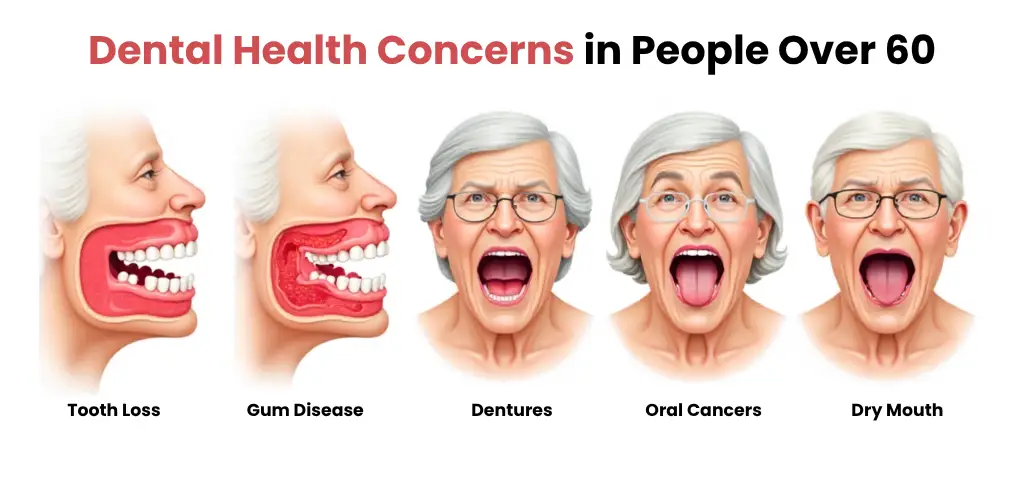
Tooth Loss
The majority of the senior population struggles with tooth loss. This significantly alters their daily lives in numerous ways. They struggle to eat normally, cannot socialize, or smile. Additionally, their facial appearance may change due to the presence of many missing teeth.
Most seniors use dentures, but issues such as appearance and fit make them uncomfortable. There is the option to get comfortable, fixed replacements in the form of dental implants.
Gum Disease
Gum disease is common among the elderly. The changes in the mouth caused by aging leave these individuals vulnerable to gum disease.
Another cause of gum issues in seniors is that they leave symptoms unaddressed. If left for longer, gum disease can speed up tooth decay.
Dentures
These dental appliances have been a crucial element for seniors who have lost all or most teeth in a row.
While most dentures are removable, there is the option to get Implant-Supported Dentures. This option offers better support and can be a long-term solution to removable dentures.
If you’re considering dentures, don’t get them until you read our comparison on Implant-Supported Bridges vs Dentures: Which is Better?
Oral Cancers
Adopting bad habits for most of your life can affect you after 60! Smoking tobacco and alcohol consumption can increase the risk of developing oral cancer.
Leaving symptoms untreated for a long time can lead to cancer. This is where regular oral exams are necessary for maintaining health.
Dry Mouth
Dry mouth isn’t a natural issue that aging individuals face. It’s actually a side effect of hundreds of medications to treat medical conditions. Having a dry mouth is dangerous because it allows food particles to remain between teeth and decay.
There are medications a dentist can prescribe to help improve saliva production.
What are the Signs of Tooth Decay in Seniors?
It can be easier to spot the early stages of tooth decay if you know what to look for. These are the most recognizable signs of decaying teeth in seniors:
Sensitivity While Eating or Drinking
Feeling an odd or even painful sensation while eating or drinking is a warning sign. In early cases, sensitivity occurs when consuming hot, cold, or sweet things. If it hurts when you eat anything, regardless of temperature, visit the dentist!
“Tooth sensitivity in older patients isn’t about age; it’s a reflection of issues like root exposure, thinning enamel, and untreated cavities.”
— Dr. Alexander Heifitz, founder of 65 Broadway Dental NYC
Bad Breath
Persistent bad breath, called halitosis, is another sign that oral care has been neglected. Bad breath usually means gum disease, but it can also point to decaying teeth. It can remain even after brushing and using mouthwash.
Bleeding or Swelling Gums
Swollen or bleeding gums are signs of infection in the gums. It’s only a matter of time before it spreads to the teeth.
Chewing Difficulty
Any pain or even discomfort while eating is a sign of tooth decay. Tooth pain or looseness can create a difficult chewing experience for seniors. The pain could be arising from holes that are exposing your nerves to food particles.
Getting to the root of the problem will be necessary to make eating pain-free again.
Tooth Loss
Tooth loss is common among older people who haven’t taken care of their teeth. Depending on the number of teeth lost, replacing these teeth can be costly. After losing one tooth, it’s vital to remain aware of your habits.
Aching Teeth
Toothaches are telling of the extent of damage done to the teeth. When a throbbing pain is felt without even using your teeth, it can mean the bacteria have reached the pulp.
The deeper the infection, the more likely it is that you will lose the tooth to decay.
Holes or Color Change
The sudden appearance of colored spots on teeth is evidence of decay. Another sign is when holes or pits appear on the tooth surface.
Once these start to show, it signals it’s time to make a dentist appointment. Dentists may not be able to stop the decay, but dental cleaning will slow it.
Loose Teeth
When teeth become loose, it’s an obvious sign of severe decay. At this point, there may not be many options available to save the tooth.
A more concerning reason for loose teeth could be bone loss. Before attempting a fix, your dentist may suggest a bone graft if you’re a suitable candidate.
How to Prevent Severe Tooth Decay in Seniors?
Although seniors are naturally more prone to decaying teeth, there are ways to limit it. The following tips can help delay tooth decay in people over 60:
Go for Regular Dentist Visits
As we age, our dental health naturally starts to weaken. This means more frequent dentist visits should be a staple. Specific dental procedures enable dentists to help seniors boost their dental well-being.
Regular dentist visits can catch and stop decay before it becomes severe. The dentist will quickly take a 3D scan to gain better visibility of your teeth.
Follow Dentist-Advised Oral Practices
Visiting a dentist regularly provides seniors with new advice on what to do and what not to do. This helps them follow the right oral care practices for their needs.
Sometimes, certain conditions require special care; dental visits can provide it! Your dentist may give you mild medications or a new toothpaste if needed.
Drink More Water
Dehydration is a condition that can easily lead to dry mouth. Seniors must avoid dehydration and dry mouth, as it can accelerate decay. Saliva plays a crucial role in removing food particles and breaking them up.
Learn more about preventing and managing dry mouth naturally in our blog on dry mouth causes and natural solutions.
Items that stimulate more saliva production are gums, lozenges, and drinking more liquids. Also, you’ll want to replace juices and sodas with water to prevent acidic items.
Start a Healthy Diet
Diet can influence oral health, and so choosing to eat the wrong foods can be damaging!
Limiting sticky and sugary foods before the age of 60 is a good idea. Replace bad foods with nutritious and beneficial foods.
Eat more dairy, including foods rich in calcium. Eat more leafy greens, nuts, and fish to gain the right nutrients. They prevent tooth decay and help maintain bone density in the bones supporting teeth.
Conclusion
Increasing numbers of cavities can be a concern for elderly people over 60. This is no coincidence, since a weakened immune system can make seniors more prone to oral bacteria.
Dry mouth, diet, mobility issues, enamel erosion, and low fluoride intake can lead to tooth decay. Visiting a professional dental clinic, like 65 Broadway Dental, ensures seniors get preventative and diagnostic treatment for decay.
Care at 65 Broadway Dental
At 65 Broadway Dental, we help adults over 60 understand why tooth decay can happen faster with age. We explain the causes in simple words and offer gentle care to protect teeth and gums. Our goal is to keep your smile strong, comfortable, and healthy for years to come.
FAQs
1. Is it normal to lose teeth in your 60s?
No losing teeth after 60 isn’t normal! It’s not normal to start losing teeth once you reach the age of 60. If it’s happening to you, there must be another reason for it. That reason could be underlying health conditions, gum disease, or untreated cavities.
2. How often should seniors over 60 get their teeth cleaned?
Seniors 60 and over must get their teeth cleaned every 6 months or twice a year. People who are at a higher risk of cavities must have more frequent cleanings. They are advised to visit the dentist 3 to 4 times a year.
3. How to prevent tooth decay in old age?
Visiting the dentist frequently, maintaining oral care, eating a balanced diet, and drinking water to stay hydrated can prevent tooth decay.
4. At what age will tooth decay occur?
It can occur at any time throughout life if care is not taken. This means that anyone at any age is at risk of decay. However, people over 60 are especially prone to getting cavities.
5. Why am I getting more cavities as I get older?
As people get older and pass the age of 60, they become more vulnerable to cavities. A major reason is that at this age, their immune system weakens. As a result, it cannot fight off oral bacteria like it previously could.
6. Is tooth loss linked to dementia?
Yes, research has shown that the two are linked. Individuals with more missing teeth were more likely to develop dementia. It highlights the importance of receiving suitable dental care.

Dr. Alexander Heifitz (Author)
Dr. Alexander Heifitz is the founder of 65 Broadway Dental in NYC, where he combines advanced dental expertise with a patient-first approach. He specializes in cosmetic and restorative treatments such as dental implants, veneers, Invisalign, and smile makeovers, helping New Yorkers achieve both oral health and confidence.
Booking An Appointment
Looking for a reliable dentist in Downtown NYC? Whether you need a routine cleaning, urgent care, or a full smile transformation — we’ve got you covered. We accept most PPO insurance plans and offer flexible scheduling.
+1 (212) 430-3888
Call for appointment
Walk-ins Welcome / Same-Day Appointments Available

Related Blogs
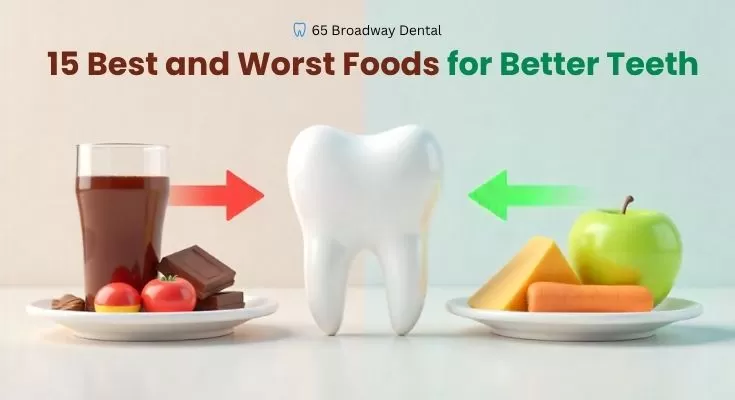
15 Best and Worst Foods for Better Teeth (Dentist-Approved Guide)
Discover the 15 best and worst foods for better teeth. Learn which to eat and avoid for stronger, healthier, cavity-free teeth and gums!
Read More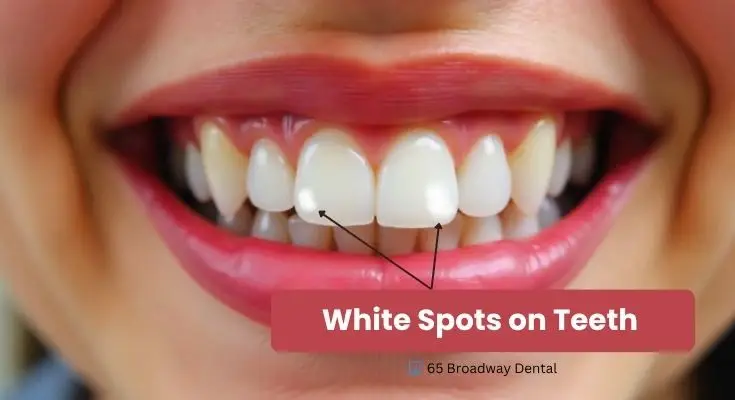
White Spots on Teeth: Early Cavity Warning or Something Else?
White spots on teeth may signal early cavities or enamel issues. Learn causes, prevention, and when to see your dentist for proper treatment.
Read More